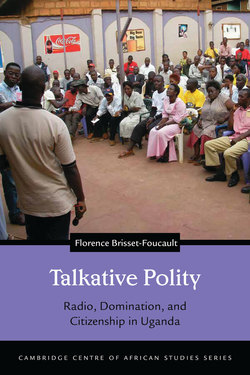Talkative Polity

Реклама. ООО «ЛитРес», ИНН: 7719571260.
Оглавление
Florence Brisset-Foucault. Talkative Polity
Отрывок из книги
Talkative Polity
Series editors: Derek R. Peterson, Harri Englund, and Christopher Warnes
.....
According to Museveni, political modernity can be reached only by annihilating the mechanisms that favor the permanence of “archaic” features, namely, ethnic and religious sectarianism. By parting with primary solidarities that cloud judgment and lead to making irrational political decisions based on identity, citizens could make choices favoring development.79 Museveni believes that “ethnicity and sectarianism [. . .] are short term problems”80 that will be overcome through commerce, education, work, and a nonpartisan form of collective mobilization.
One of the main vehicles for the emergence of this renewed society was the institutionalization of a system of “grassroots democracy,” incarnated by the Resistance Councils, today called Local Councils (LCs). The smaller units (RC1s and LC1s), which correspond to the village levels (or “zones” in urban areas), are open to anyone age eighteen and above.81 Citizenship as mediated by the RCs is based on residence,82 and transcends ethnic, party, and religious affiliations.83 The RC system was more or less successful, depending on the region.84 Whereas they were spheres of political mobilization and education during the war, they were then transferred under the authority of the Ministry of Local Government and refocused on local issues, typically managing security and public works issues. RCs also act as a channel between the government and the local populations.85 Attendance at meetings has become more uncertain with time, and RCs have not always managed to overcome older established social hierarchies.86 Despite these limitations, many have acknowledged the fact that the councils have been widely invested and appropriated by Uganda’s population, sometimes with great enthusiasm, in particular in the South of the country. Moreover, RCs saw their mandate enlarged for a few years at the beginning of the 1990s, as they were used as local arenas of mobilization and discussion of the new constitution project.87 Generally, scholars agree that they led to important mutations in people’s and local leaders’ political practices and conceptions of political legitimacy, of citizens’ roles, and of the relationships between rulers and ruled.
.....